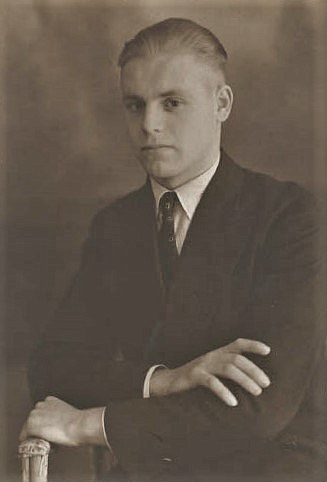In the early hours of the invasion of Normandy on June 6, 1944 (D-Day), U.S. Army and British paratroopers were dropped behind enemy lines to help block approaches to beachheads and secure the town of St. Mere Eglise.
The parachute of Thomas Ivie Murphy, 26, was one of thousands dotting the French skyline during this fateful moment in history.
"My uncle, Herbert Braune, was a lance corporal in the German army and in France on D-Day," Frank Voertmann said. "It was just before dusk when the sky was filled with parachutes coming down on my uncle's position behind the lines in a rest area for German soldiers."
Voertmann, who grew up outside of St. Louis, noted his mother and one of her brothers immigrated to the United States in the 1920s, settling in Missouri. Their brother (Voertmann's uncle) remained in Germany and was drafted into the German army during World War II, at more than 30 years of age.
"One of the (U.S.) paratroopers began firing on my uncle as he was coming down to earth," Voertmann continued. "The parachute caught on a tree limb and the soldier dropped his rifle and was hanging helplessly in the tree. It was Thomas Murphy, of North Carolina, I later discovered."
In later years, his uncle told him that at the time of the invasion, he and his fellow German soldiers were cautioned to avoid taking any Allied prisoners since manpower was needed in battle. Ignoring these orders, Lance Cpl. Braune took Murphy prisoner and hunkered down for the night as they listened while firefights erupted around them.
Voertmann said his uncle's compassion and decision not to kill the paratrooper was likely because he had family living in the United States. Also, being 34 years old at the time, he may have possessed less combative temperament than many of the more youthful soldiers with whom he served.
"During the night, Thomas was so grateful that my uncle didn't shoot him that he gave him a dollar bill with his name and other information on it," Voertmann said. "The next morning, the Germans were still in command of the area, so my uncle took Thomas back to the command post to turn him over as a prisoner."
As Germany began to buckle under the Allied advance, Lance Cpl. Braune later surrendered to U.S. forces and was sent to a prisoner of war camp in England. He was released from custody in July 1947, returning to his home in Jena, Germany, and reuniting with his wife, the former Mary Ehmer. However, he continued to wonder whether the American paratrooper who gave him the dollar had survived the war.
Voertmann noted, "The city he lived in was in the old East Germany, and my uncle was eventually employed as an optical polisher with the Carl-Zeiss-Jena factory after the war. He was able to come stay with us here in Missouri for three months in 1977, and I got to know him pretty well at that time.
"Then I had the opportunity to go stay with him in East Germany for about three weeks in 1983."
During these visits, Braune asked his nephew if he could assist him in determining the status of Murphy. In the days prior to the internet, Voertmann found he lacked the research and cross- referencing capabilities to be successful in such an endeavor.
"I kept trying to find him but just wasn't getting anywhere until the internet came along," Voertmann said. "Sadly, my uncle passed away in 1999 and never knew what became of the American soldier."
As the internet became more of a widespread reality, Voertmann continued to search for Murphy's whereabouts. Through archival sites, he tracked down information revealing the former soldier had trained at locations including Fort Bragg, North Carolina, and was discharged from the U.S. Army on Oct. 29, 1945.
"My research indicated that he served as a farmhand in North Carolina before the war," Voertmann said. "Additionally, I found that he was later employed at a furniture factory and was only 45 years old when he died from cancer in 1963."
Through his persistence, Voertmann located the contact information for the late soldier's daughter, reaching out to share with her the story of the dollar and his uncle's brief wartime acquaintance with her father.
"She was not at all aware of her father's war history, so it was nice to be able to share some of that with her," he said.
Voertmann wishes his uncle could have lived long enough to have learned of the fate of the American soldier whose life he preserved in a tense moment. Despite his uncle's death, he believes he has fulfilled a commitment made years ago, bringing closure to a chapter in history that began in the dark skies of France during World War II.
"It is really an interesting story about my uncle and the dollar bill he was given, but mostly I think about Private Murphy and all of those young soldiers from the U.S. who parachuted into France prepared to do heroic things to end the war," he said.
"That dollar bill reflects a special moment of humanity in the war and remains with my cousin in Germany. For me, it was a pleasure to have been able to carry out my uncle's wishes and find what happened to Private Murphy after the war."
Jeremy P. Amick writes on behalf of the Silver Star Families of America.

